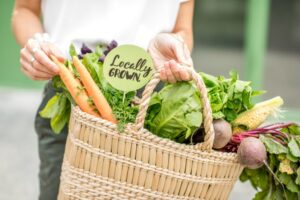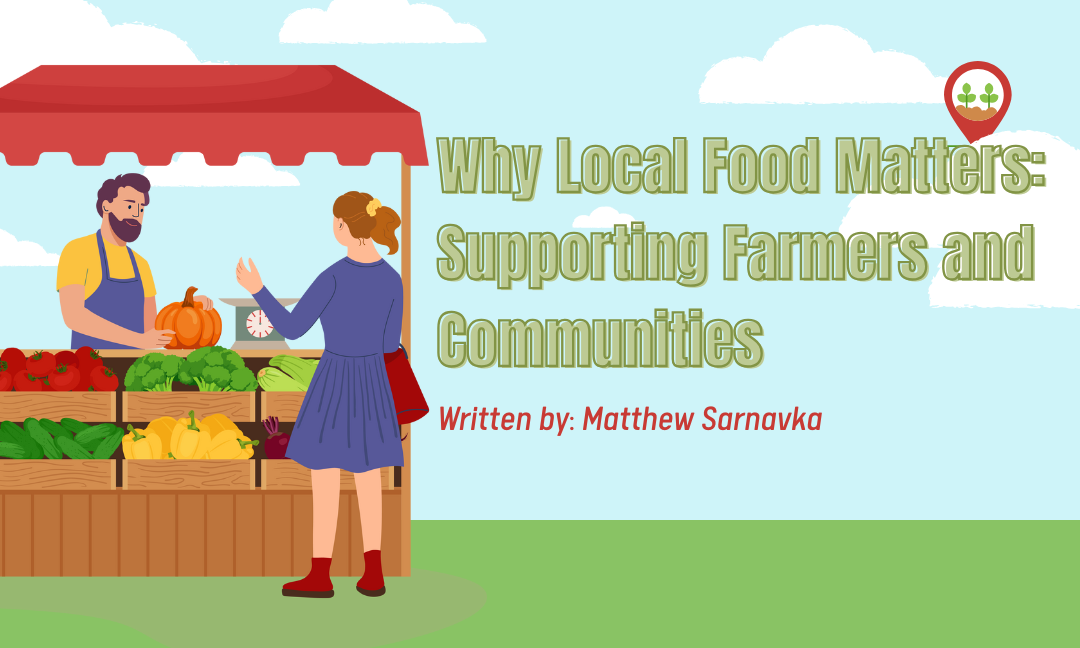Written by: Matthew Sarnavka
Edited by: Matthew Sarnavka & Rayna Almas
Designed by: Andria Sahar
Published by: Rayna Almas
Why Local Food Matters: Supporting Farmers and Communities
The benefits of farmers’ markets and community-supported agriculture
Many of us don’t think about where the food we eat comes from. We go to the grocery store, grab what we need, and get on with our day. But did you know that the average meal in North America travels over 2,400 kilometres from farm to plate? Imagine your dinner flying from Toronto to Miami before landing on your table. What if we brought our food closer to home? That’s where local food comes in; things like fruits, veggies, eggs, meat, dairy, and even honey are grown or raised close to where you live. Not trucked halfway across the country or flown from another continent. Just grown by someone down the road. That small change, choosing more local food, can make a huge difference.

Why it matters
The reason why local food is so important is for various benefits, such as:
Environmental Benefits
Depending on where you live, going to a local vendor or markets can be: less travel = fewer emissions. When your apples come from a local orchard instead of 3,000 km away, they don’t need to be refrigerated in a truck or packed in plastic for days. That means less fossil fuel burned and less energy wasted. Additionally, a lot of small local farms use sustainable or organic practices; they care more about soil health, don’t drown crops in chemicals, and often grow a bigger variety of plants, which is better for pollinators and biodiversity. Another bonus is that the shorter the supply chain, the less food waste. Fewer things go bad in transit, and more stuff ends up on your plate instead of in a landfill.
Economic Resilience
Buying from local farmers puts money right back into your community. It keeps family-run farms and businesses alive, supports local jobs, and strengthens your local economy. It’s investing in your town through food. Plus, local food systems make us more resilient. For example, if supply chains get messed up like they did in COVID, communities that rely on local producers are better off than those depending on faraway mega-farms.
Better nutrition and taste
In my opinion, fresh food tastes better. But don’t just take it from me, local food doesn’t have to sit on a truck for a week or get treated with chemicals to stay “fresh.” It’s picked closer to ripeness and gets to you faster. That means it’s packed with more nutrients and more flavour. If you ever bite into a tomato from a backyard garden and think, “Wow, this tastes much better!” It’s because they are not processed and do not have artificial preservatives or additives that packaged/store food has.
Challenges and misconceptions
But Isn’t Local Food More Expensive? Yes, that may be true; you could potentially pay a bit more for some things. But when you buy in season, or from bulk boxes at the market, or even grow a few things yourself, namely herbs or tomatoes, you can save money. Sometimes local food can also have some issues with availability. If you live in a more urban or larger city, the chance that local food sources will be available to you is unlikely, so it makes the trip a bit more difficult. Lastly, there may be some trouble with sustainability. Local food sources do not use anything to keep the food lasting exceptionally long, meaning that they have a normal life span before they go bad. Conversely, you know the food is fresh and high quality when it does not include any preservatives, which is a small price to pay. With that being said, it’s important to think about the value, the better nutrition, fresher taste, and supporting people in your community is worth it in the end.
How to support local food systems
You don’t have to tune your entire diet, but it can be important to try one or two of the following things:
Going to Farmers’ markets
St. Jacobs Farmers’ Market and Kitchener Market are both local gems in Kitchener. It’s full of fresh food straight from nearby farms, including veggies, meats, baked goods, and more. You get to meet the people who grow your food, which is pretty cool. Plus, shopping there supports small local businesses and farmers. It’s also a great place to spend time with others and see what the community is doing.
Community gardens
If you don’t have a backyard, that’s no problem. The region of Waterloo has many places where you can go to community gardens, allowing people to grow their food in shared spaces around the neighbourhood and also buy locally. It’s a fun way to learn gardening, meet others, and enjoy fresh produce without leaving your area.
Community-supported agriculture
Try community-supported agriculture, like a weekly food box from a local farm. You pay ahead and get whatever’s in season, fresh and sometimes new-to-you veggies. It helps farmers and gives you fresh food right at your door or pickup spot. Also, even groups like our very own Youth Food Systems (YFS) are doing great things with community-supported agriculture locally.
Conclusion
Local food is not just a trend, it’s a smart choice for your health, your wallet, your community, and the planet. It’s one of those rare choices that has multiple benefits that people often overlook. So the next time you’re picking out food for dinner, ask yourself if you can get this locally. Your taste buds and your local farmers will thank you.
References
Image Credit: https://davidsonenvironmental.ca/the-local-food-movement-why-buying-local-is-best-for-the-environment/
Information Credit:
https://sofresh.com/taste-the-truth-why-fresh-ingredients-matter/
https://www.regionofwaterloo.ca/en/living-here/community-gardens.aspx

